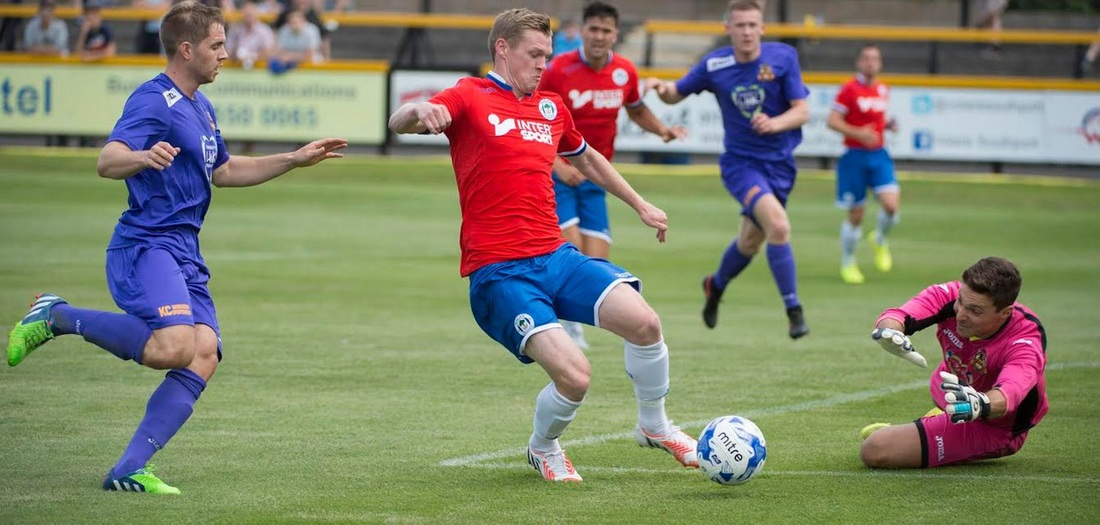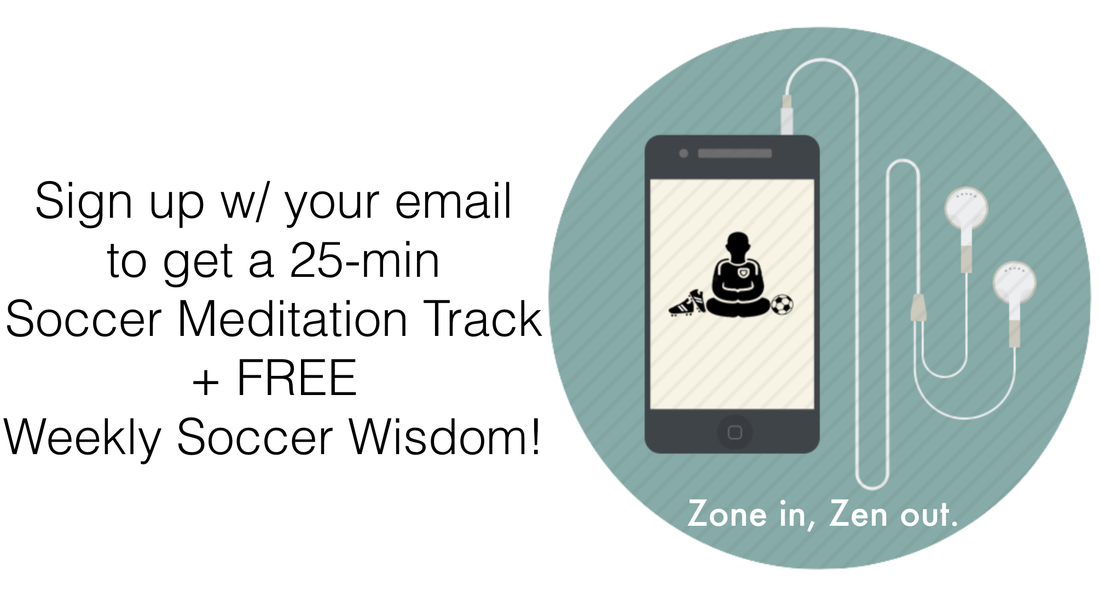|
Jonathan Viscosi is a (Canadian!) professional football player (Goalkeeper!) playing in England. He's looking to share his insights with the public to hopefully inspire and help others like himself pursue their dreams and reach their full potential. (Learn more about Jon here) I'm really excited to share this post in particular because of the extreme value I feel this topic has and how little exposure it gets in mainstream athletics. Meditation and Mindfulness are HUGE, so please check it out. Meditation is my #1 non-negotiable habit, you couldn’t pay me not to do it. It’s one of my most suggested practices as there are so many benefits in athletics + in life. Plus, studies show it literally improves your brain in a few weeks! Nuts, eh?!! If you're looking to cultivate your mindfulness + other areas that will help you be successful check out my post on Morning Routines + this nifty tool to keep you on track. Now, on to the post!! Enjoy! -z p.s. if you're diggin' it, check out these apps to help your mindfulness:
We have all heard the saying, “football is 10% physical and 90% mental”. Yet we do not spend nearly as much time training our minds as we do our bodies. I have always been an advocate for training the mental side of the game. It started early in my youth career when my under 14 coach called me ‘mentally weak’ for making a mistake. As much as that comment enraged me, I took it on board and bought my first book on sports psychology and started practicing the techniques to become ‘mentally tough’. Since then I’ve read every book I can find on the subject, and a lot of the techniques and methods I have learned have become second nature, and I apply them before, during, and after matches and training sessions. However, I began noticing that when things would go wrong in a match, I had a hard time forgetting about it and moving on to the next moment. I found it hard to let go of the events that I didn’t foresee in my preparation, and it would affect the rest of my performance. I feel like this is a common occurrence for many players. You can always notice when a player makes a mistake, the following contributions are usually bellow their normal standards. I associate this problem with the mental preparation we’ve been taught through sports psychology. Every book I’ve read talks about visualization and imagery. While these mental exercises are very powerful and beneficial, they have an equivalent down side to them. Matches are full of unexpected events, and it is impossible to prepare mentally for every situation we will experience in a match. So it is very likely to experience an event that you did not visualize before hand. The best way to prepare and deal with these unexpected events is to maintain a present mind-set throughout the match; being completely tuned in and focused on the ‘here and now’. When you are fully present, your mind switches off and your body takes over. This allows you to deal with whatever situation you will encounter, as your actions are based on the intuition you have developed through your experience in the game. This is what happens when you’re at your best and ‘in the zone’ as some like to call it. Presence is the key to optimal performance, but none of the books have really taught me how to build and develop a present mindset. How do you train presence?? I found the answer I was looking for through practicing yoga where I have been introduced to this brilliant concept called Mindfulness. Mindfulness is the practice of focusing your awareness on the present moment; while acknowledging and accepting your thoughts, feelings, and sensations during that present moment. The mind is only capable of experiencing one thought at a time, but due to our hectic metaphysical world, the mind only holds the one thought for a short amount of time before moving onto the next. So our thoughts race through a fast moving mind stream called our ‘stream of consciousness’. By neglecting awareness to these thoughts, like most of us do through our fast paced lifestyles, the range of thoughts we experience becomes very broad and forms a cluttered mind. Just like an office worker, if your desk is very cluttered it is extremely difficult to accomplish anything, and the same goes for our minds. If our mind is cluttered we will fail to do anything at our best and will be functioning below our full potential. Through practice we can bring awareness to our stream of consciousness, and can begin to narrow the range of thoughts that flow through our stream creating space and clarity in the mind, to allow us to function at our fullest capability and produce our best work. Mindfulness is the link that connects mind, body, and spirit. This harmonious connection is needed to enter your ‘flow state’, which leads to optimal performance. (Click here to read Jon's post on Flow) When I look back on my best performances, I acknowledge that I was in a flow state, but I achieved it subconsciously. I didn’t consciously enter it, it just happened. So just as I discussed in my post on Consistency in Approach, if we can consciously manage our mind stream when performing we will give ourselves the best chance to achieve flow and perform optimally. Mediation has many benefits, one of them being a form of deep relaxation. So not only will it develop mindfulness for you to take onto the pitch with you, but it will also aid recovery and rejuvenate your energy, which is vital for high performance athletes. Like any skill, mindfulness can be developed through practice. The best form of practice is meditation. There are many ways to meditate and I highly suggest looking into various methods, trying them out and seeing which ones work best for you. Essentially, meditating is about completely focusing on the rhythm of your breath, and feeling the sensations of being completely present and immersed in the moment. I used to confuse meditation and visualization. They are two separate activities and should be done separately. When you visualize your mind is imagining the things you want to happen. When meditating your not thinking of anything else but the present moment. Naturally there will be thoughts that enter your mind; acknowledge them, but always go back to the rhythm of your breath. At first you will find it very difficult to sit still and meditate, but like everything the more you practice the better you become. If you sit down and meditate for twenty minutes, you might only be completely focused on your breath for one minute out of the twenty, and that would be a success. You would then try to stretch that minute further every time you practice. Mediation has many benefits, one of them being a form of deep relaxation. So not only will it develop mindfulness for you to take onto the pitch with you, but it will also aid recovery and rejuvenate your energy, which is vital for high performance athletes. I started practicing mediation just over a year ago when I was injured. I still find it a very difficult task but I have been improving and feel the benefits of it. I recommend turning it into a daily ritual. I try and practice twice a day, morning and night. In the morning it’s a quick one. I roll out of bed, lay on my back and try and get ten consecutive deep breaths through my nose where I am completely focused on the rhythm of my breath and my conscious stream. I find by doing this just as I wake up, I am entering the day in a present and mindful state, and I try to mountain that state throughout all I do during the day. At night after my day is finished and I am ready for bed, I lie down again on the floor and try and enter a deeper meditation for about twenty minutes; again completely focusing on the rhythm of my breath and the sensations that arise. This helps me clear my mind from the day’s events and stops me from thinking about tomorrows events, and completely relax and rejuvenate my mind, body, and spirit before I go to sleep. Through practicing this daily ritual I have found it easier to control my thoughts and increase my presence and focus in training and games, which in turn has helped me consciously achieve my flow state more often. Aside from improving my performances, it has also increased my day-to-day life experience. Being mindful of your thoughts throughout the day and being present will allow you to experience your daily activities in a higher conscious state of being, which means you experience these things with full awareness rather then when your mind stream wonders and your physically there but mentally somewhere else.
To summarize, without going to off topic, mindfulness will not only help you achieve your optimal performance level, but it will also help you live a fuller, clearer, and happier life. Like everything, give it time, and you will begin to feel the magical powers of mindfulness through meditation. JV p.s. Here are some links that will help you understand meditation and teach you some techniques on how to practice. http://yourinnerbuzz.com/mindfulness-in-football-are-you-mad/ http://dailyburn.com/life/fitness/mindfulness-techniques-athletes/
1 Comment
10/30/2018 10:39:47 pm
This is actually a great suggestion. Meditation clears the mind and opens it up to a clearer vision. Thanks for sharing this!
Reply
Leave a Reply. |
Zak DrakeI love helping players optimize their soccer careers + lives through actualizing their potential. Categories
All
Archives
June 2018
|



 RSS Feed
RSS Feed